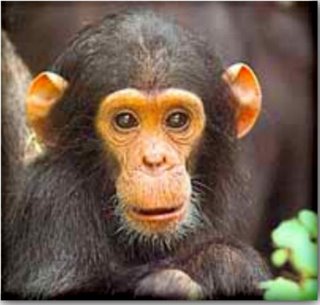Found: The Giant Lion-Eating Chimps of the Magic Forest
.jpg)
.jpg)
This sounds like a fake new story, but it appears to be real. The Guardian is a real newspaper. I welcome any comments on the veracity of this story.
Found: The Giant Lion-Eating Chimps of the Magic Forest http://environment.guardian.co.uk/conservation/story/0,,2126328,00.html
James Randerson, science correspondent
Saturday July 14, 2007
The Guardian
Deep in the Congolese jungle is a band of apes that, according to
local legend, kill lions, catch fish and even howl at the moon. Local
hunters speak of massive creatures that seem to be some sort of
hybrid between a chimp and a gorilla.
Their location at the centre of one of the bloodiest conflicts on the
planet, the civil war in the Democratic Republic of Congo, has meant
that the mystery apes have been little studied by western scientists.
Reaching the region means negotiating the shifting fortunes of
warring rebel factions, and the heart of the animals' range is deep
in impenetrable forest.
But despite the difficulties, a handful of scientists have succeeded
in studying the animals. Early speculation that the apes may be some
yeti-like new species or a chimp/gorilla hybrid proved unfounded, but
the truth has turned out to be in many ways even more fascinating.
They are actually a population of super-sized chimps with a unique
culture - and it seems, a taste for big cat flesh.
The most detailed and recent data comes from Cleve Hicks, at the
University of Amsterdam, who has spent 18 months in the field
watching the Bili apes - named after a local town - since 2004. His
team's most striking find came after one of his trackers heard chimps
calling for several days from the same spot.
When he investigated he came across a chimp feasting on the carcass
of a leopard. Mr Hicks cannot be sure the animal was killed by the
chimp, but the find lends credence to the apes' lion-eating
reputation.
"What we have found is this completely new chimpanzee culture," said
Mr Hicks. Previously, researchers had only managed to snatch glimpses
of the animals or take photos of them using camera traps. But Mr
Hicks used local knowledge to get closer to them and photograph them.
"We were told of this sort of fabled land out west by one of our
trackers who goes out there to fish," said Mr Hicks whose project is
supported by the Wasmoeth Wildlife Foundation. "I call it the magic
forest. It is a very special place."
Getting there means a gruelling 40km (25-mile) trek through the
jungle, from the nearest road, not to mention navigating
croc-infested rivers. But when he arrived he found apes without their
normal fear of humans. Chimps near the road flee immediately at the
sight of people because they know the consequences of a hunter's
rifle, but these animals were happy to approach him. "The further
away from the road the more fearless the chimps got," he added.
Mr Hicks reports that he found a unique chimp culture. For example,
unlike their cousins in other parts of Africa the chimps regularly
bed down for the night in nests on the ground. Around a fifth of the
nests he found were there rather than in the trees.
"How can they get away with sleeping on the ground when there are
lions, leopards, golden cats around as well as other dangerous
animals like elephants and buffalo?" said Mr Hicks.
"I don't like to paint them as being more aggressive, but maybe they
prey on some of these predators and the predators kind of leave them
alone." He is keen to point out though that they don't howl at the
moon.
"The ground nests were very big and there was obviously something
very unusual going on there. They are not unknown elsewhere but very
unusual," said Colin Groves, an expert on primate morphology at the
Australian National University in Canberra who has observed the nests
in the field.
Prof Groves believes that the Bili apes should prompt a radical
rethink of the family tree of chimp sub-species. He has proposed that
primatologists should now recognise five different sub-divisions
instead of the current four.
Mr Hicks said the animals also have what he calls a "smashing
culture" - a blunt but effective way of solving problems. He has
found hundreds of snails and hard-shelled fruits smashed for food,
seen chimps carrying termite mounds to rocks to break them open and
also found a turtle that was almost certainly smashed apart by chimps.
Like chimp populations in other parts of Africa, the Bili chimps use
sticks to fish for ants, but here the tools are up to 2.5 metres long.
The most exciting thing about this population of chimps though is
that it is much bigger than anyone realised and may be one of the
largest remaining continuous populations of the species left in
Africa. Mr Hicks and his colleague Jeroen Swinkels surveyed an area
of 7,000 square kilometres and found chimps everywhere. Their unique
culture was uniform throughout.
However, the future for the Bili apes is far from secure. "Things are
not promising," said Karl Ammann, an independent wildlife
photographer who began investigating the apes 1996. "The absence of a
strong central government has resulted in most of the region becoming
more independent and lawless. In conservation terms this is a
disaster."
.gif)










.jpg)
No comments:
Post a Comment